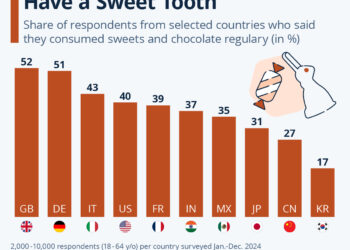The Erosion of Trust in American Institutions: A Closer Look
Understanding the Landscape of Distrust
In recent years, trust in American institutions has seen a significant decline, reflecting a growing skepticism among the populace. Various entities, from government to big tech, have been scrutinized by the public, raising questions about accountability and reliability. According to a survey conducted by Statista Consumer Insights, these concerns are not unfounded, as many Americans report an alarming lack of confidence in the organizations intended to serve them.
Key Statistics from the Survey
Distrust in Big Tech and Government
The survey results reveal a stark reality regarding trust in a couple of significant sectors. Only 8% of Americans expressed trust in big tech companies, while just 12% placed their faith in government institutions. This profound distrust points to larger issues of privacy, surveillance, and the role of these entities in daily life. As technology evolves and becomes more integrated into our lives, the public’s discomfort surrounding data privacy and corporate responsibility grows correspondingly.
Financial and Educational Institutions Under Fire
Further compounding the issue of trust is the perceived integrity of financial and educational institutions. The survey noted that only 20% of respondents trusted financial organizations—a telling reflection of the fallout from financial crises and scandals that have marred the reputation of banks and similar entities. Similarly, educational institutions fared poorly, with only 20% expressing trust. The skepticism towards these institutions may also stem from rising tuition costs, student loan crises, and questions surrounding the value of degrees in today’s job market.
The Role of Religious Institutions
Evaluation of Faith-Based Organizations
Interestingly, religious institutions garnered a modest trust level of 21%. This figure prompts deeper inquiry into how religious organizations are perceived today in comparison to eras with higher faith engagement. The decline may also reflect societal shifts towards secularism and increased public discourse surrounding accountability and moral integrity within these organizations.
Trust in Consumer Protection Agencies
Why Are Consumer Agencies Viewed with Distrust?
Even consumer protection agencies, designed to safeguard the interests of everyday Americans, only managed to achieve 17% trust among survey participants. This alarming statistic may hint at a perceived ineffectiveness or lack of enforcement in protecting consumer rights, leading to frustration and further mistrust.
Healthcare Providers and Military: A Slightly Brighter Outlook
Comparison of Trust Levels
Despite the general trend of distrust, healthcare providers and military institutions are viewed comparatively more favorably. Trust levels here are slightly higher, ranging from 27% to 31%. This relative confidence may be tied to their roles during crises, such as the COVID-19 pandemic, showcasing their importance in public health and safety.
Nonprofits, Charities, and Community Trust
Levels of Confidence in Charitable Organizations
In the realm of charities and nonprofits, the trust rate hovers around 22-23%. While these organizations often work to uplift communities and help those in need, the sustainability and transparency of their operations have come under scrutiny. This disconnect may deter individuals from fully embracing these entities despite their noble missions.
A Significant Percentage Lacking Trust
The Widespread Distrust Phenomenon
Most concerning is the revelation that 28% of Americans reported not trusting any of the listed institutions. This significant figure demonstrates a widespread sentiment of disillusionment and a pervasive belief that institutions fail to meet their commitments to the public.
Implications for Energy, Retail, and the Media
A Look at Other Misgivings
The survey also touched on trust in energy and utility companies, media outlets, brands, and large retail chains, all of which are viewed with suspicion by the American public. As individuals navigate an increasingly complex societal landscape, the lack of trust in these critical areas raises fundamental questions about engagement, transparency, and the purpose of these institutions in modern America.
The Consequences of Distrust
Broader Societal Effects
The consequences of this erosion of trust can ripple throughout society, affecting everything from political engagement to community cohesion. As Americans grapple with a lack of faith in the institutions meant to safeguard their interests, they face growing challenges in forming alliances and building trust within communities.
In an era where reliable information and accountability are paramount, addressing these trends will require concerted efforts from leaders across all sectors to rebuild faith in our institutions and foster a sense of shared purpose amongst the populace.






